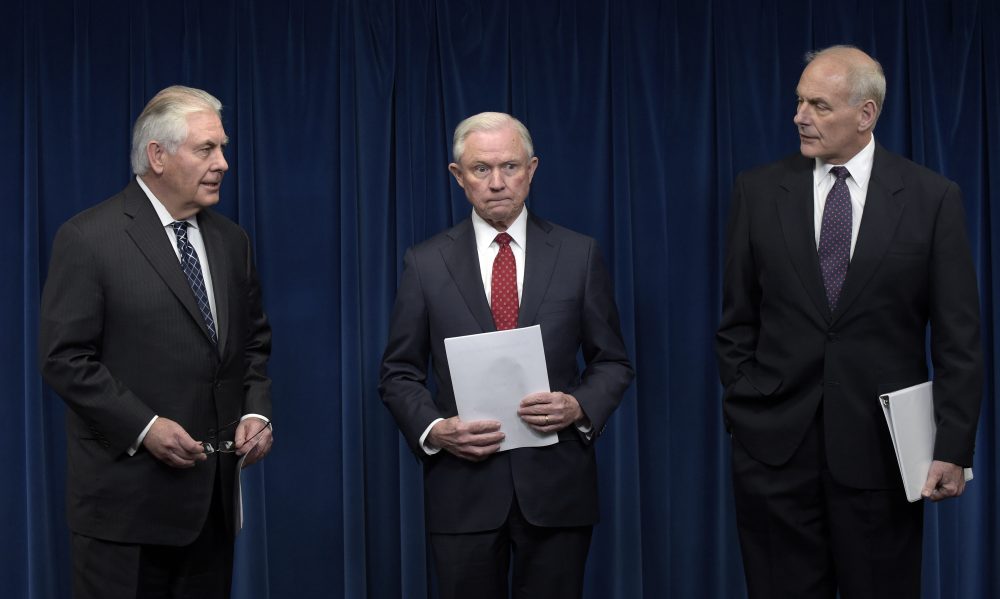Advertisement
Trump's Revised Travel Order Addresses Some Concerns, But Mass. Advocates Say Intent Is The Same

President Donald Trump signed a new executive order Monday that temporarily blocks citizens from six majority-Muslim countries from traveling to the U.S., revoking and replacing an earlier order which was stalled in federal court after a nationwide stay was issued last month.
While there are marked differences between the two orders, Massachusetts lawyers and advocates say the intent is clearly the same.
Susan Church heads the New England chapter of the American Immigration Lawyers Association (AILA). She says the group is not anticipating the same level of widespread chaos as was the case in late January when Trump's original order went into effect — as hundreds of travelers were detained for hours in U.S. airports or turned away from flights headed here. Still, the group is not taking any chances and has lined up nearly 100 immigration lawyers who are willing to volunteer at Logan Airport if need be.
"We will be available ... to help them, assist their family members who are stuck in processing, and we will be available maybe to go to court again if necessary," Church said.
The new order removes Iraq from the list of countries whose citizens will be temporarily barred entry into the U.S. Iran, Libya, Somalia, Syria, Sudan and Yemen remain on the list. The revised order also explicitly states that visa and green card holders from these countries are exempt from the restrictions, allowing for their entry into the country — a point that was at issue in a Boston federal court case following the first order. The new order also suspends the country's refugee program for 120 days, but it does not single out Syrian refugees for an indefinite ban.
The order will go into effect on March 16 — nearly two weeks after it was signed. This is a stark departure from the previous order which went into effect immediately. Church says this delay contradicts the sense of urgency expressed by the administration.
"They're telling us this is an emergency yet they delayed implementation of this new ban by two weeks almost, they said that they need more time to investigate the security concerns," she said. "So there's no way to say that in the 90 days or the 120 days everything is going to be fixed, because it's not. This is really an effort to grab headlines by this administration more than it's an effort to really address the security concerns of the United States."
But that's not how Jessica Vaughan sees it.
Vaughan is director of policy studies at the Center for Immigration Studies, an organization that supports limiting immigration. She says the revised order is more focused and compelling in explaining the need for a review of security measures. Vaughan also says she wouldn't rule out additional travel restrictions in the future.
"I would not be surprised if the government finds there's no way to improve the vetting from some of these countries," she said. "Perhaps Syria, because there have been so many counter-terrorism and homeland security officials who have been saying for so long that it is impossible because of the lack of a functioning government there ... We may end up having to extend a suspension of travel or a suspension of visa issuances for certain countries depending on what they find."
The initial 120-day closure of the refugee admission program is of special concern to Jeff Thielman, CEO of the International Institute of New England. The resettlement agency has offices in Boston, Lowell and Manchester, New Hampshire. Thielman says this new executive order is no more necessary than the previous order.
"This is pretty significant if you're a refugee family that's been waiting their turn to come to the United States for several years and you've done everything right to go through the U.S. resettlement process," he said. "You're in some place and you've been stranded there for years and we've said, 'If you go through this process, you can come here.' A few more months, four months, for people can be a long time."
Thielman's agency is scheduled to resettle eight refugees through March 16, the day Trump's new order goes into effect. That includes one person who's slated to arrive on the 16th. He says they're trying to determine what sort of ramifications the new executive order will have.
Gov. Charlie Baker said Monday afternoon that he's not yet read the president's executive order in full but maintains that Massachusetts is a welcoming state.
"A huge part of our success as a commonwealth — culturally, economically and just generally — is based on the fact that we got a lot of people in this country who bring points of view and perspectives from around the world to their work and to their communities, and that's a big part of who we are and what we're about," he told WBUR.
Attorney General Maura Healey says her office is considering legal options and "remains opposed to this misguided policy."
